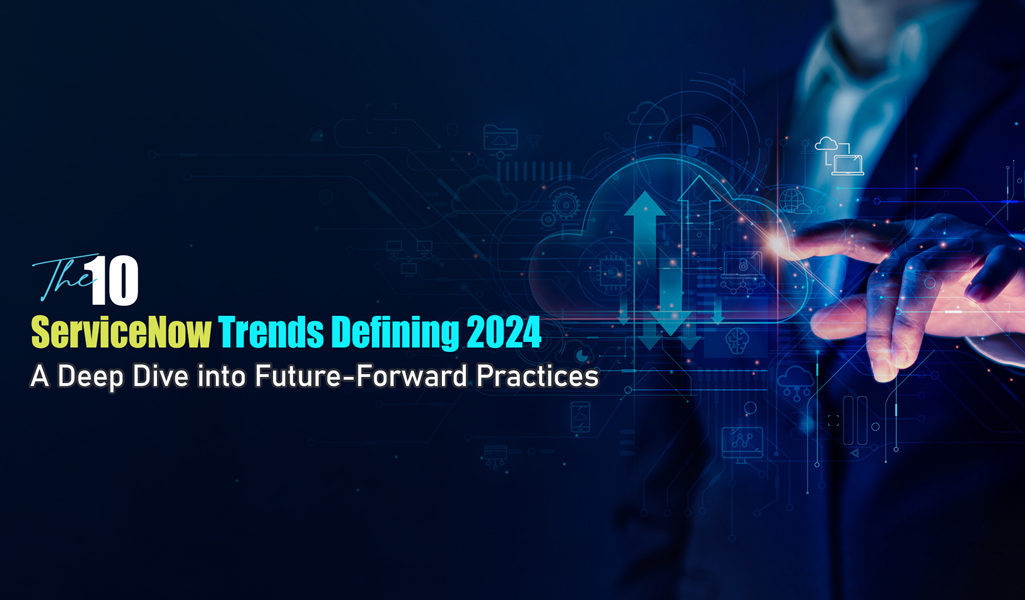
In the dynamic realm of digital transformation, ServiceNow remains a trailblazer, consistently reshaping the operational landscape and service delivery for organizations. As we embark on the journey into 2024, insights gathered from industry observations shed light on the pivotal trends poised to redefine ServiceNow's best practices for the foreseeable future. Let's delve into the top 10 trends that are set to transform the ServiceNow experience, reflecting the evolving dynamics of business, technology, and service delivery.
1. AI Dominance Takes Center Stage:
Anticipate a surge in the expectations of Return on Investment (ROI) for Artificial Intelligence (AI). This aligns seamlessly with the broader trend of democratizing access to AI/ML capabilities. Strategic investments in AI and Machine Learning (ML) are set to revolutionize customer support, fundamentally altering how organizations deliver services and harness customer data to provide a personalized experience.
2. Security and Resilience Reinforcement:
In an era dominated by cybersecurity threats, organizations express an unwavering commitment to reinforcing security. ServiceNow's IT Management (ITM) capabilities play a crucial role in mapping business services to technology, offering a comprehensive view of potential risks and dependencies, thereby contributing to overall business resilience.
3. Governance Triumphs Over Resource Constraints:
As organizations grapple with resource constraints, the need for robust governance becomes paramount. ServiceNow's core platform capabilities and Low Code/No Code (LCNC) engine empower organizations to execute legacy architecture transformation with unprecedented insight, scale, and speed.
4. Data Optimization at the Forefront:
Optimizing data models emerges as a key priority. A data-driven approach to business process digitization, optimization, and automation gains significance. Partnerships, such as the collaboration between ServiceNow and Celonis, open avenues for organizations to accelerate change and improve transparency by leveraging data to discover, monitor, and enhance processes.
5. Speed and Productivity Enhancement Prioritized:
Enhancing speed and productivity stands out as a top priority. ServiceNow's evolution from an IT-focused solution to a platform for enterprise workflows necessitates new strategies for governance, operations, and sustainment. Innovative models around service delivery are essential to meet the demands of this evolving landscape.
6. Addressing Skills Gaps for Seamless Evolution:
Concerns about skills gaps among respondents highlight the need for organizations to adapt to new technologies and practices. The rise of industry solutions on ServiceNow enables organizations to bridge skill gaps by leveraging digital workflows and integrated capabilities, thereby facilitating transformation.
7. Overcoming Change Resistance:
Change resistance emerges as a pressing challenge. ServiceNow, with its transformative capabilities, serves as a catalyst for change. Disrupting legacy enterprise architecture, it offers organizations the means to execute transformation with unprecedented insight, scale, and speed.
8. Seeking Transformation Catalysts Across Industries:
Respondents actively seek transformation catalysts across various industries. ServiceNow's solutions in Education, Energy & Utilities, Financial Services, Telecommunications, Healthcare, and Government, showcase the platform's integration capabilities and digital workflows as a frontrunner in driving transformative change.
9. ESG Integration Gains Prominence:
In an era where Environmental, Social, and Governance (ESG) considerations are gaining prominence, organizations turn to ServiceNow for comprehensive strategies in reporting and managing ESG-related data. The platform's capabilities position it as a serious contender for capturing, managing, and reporting on various aspects of ESG-related activities.
10. Operating for Innovation:
ServiceNow's evolution into a platform for enterprise workflows necessitates a paradigm shift in governance, operations, and sustainment. The emergence of innovative models around service delivery for ServiceNow showcases the platform's trajectory from IT-focused solutions to a driving force behind enterprise-wide innovation.
Strategic Navigation Through Trends:
As businesses navigate these transformative trends, they can empower themselves by leveraging ServiceNow's capabilities. The focus should be on embracing change, optimizing data utilization, and fostering innovation. Organizations can stay ahead in the evolving landscape by adopting industry-specific examples and aligning themselves with ServiceNow's dynamic trajectory, setting the stage for success in the digital era. As we journey into the future, businesses must embrace these trends and leverage the expertise of partners like Mergen to stay ahead in the ever-changing landscape of ServiceNow and digital transformation. To leverage ServiceNow and transform your organization, contact us!
Allow our IT professionals to identify your company's needs and help you
save time and the cost of your business.